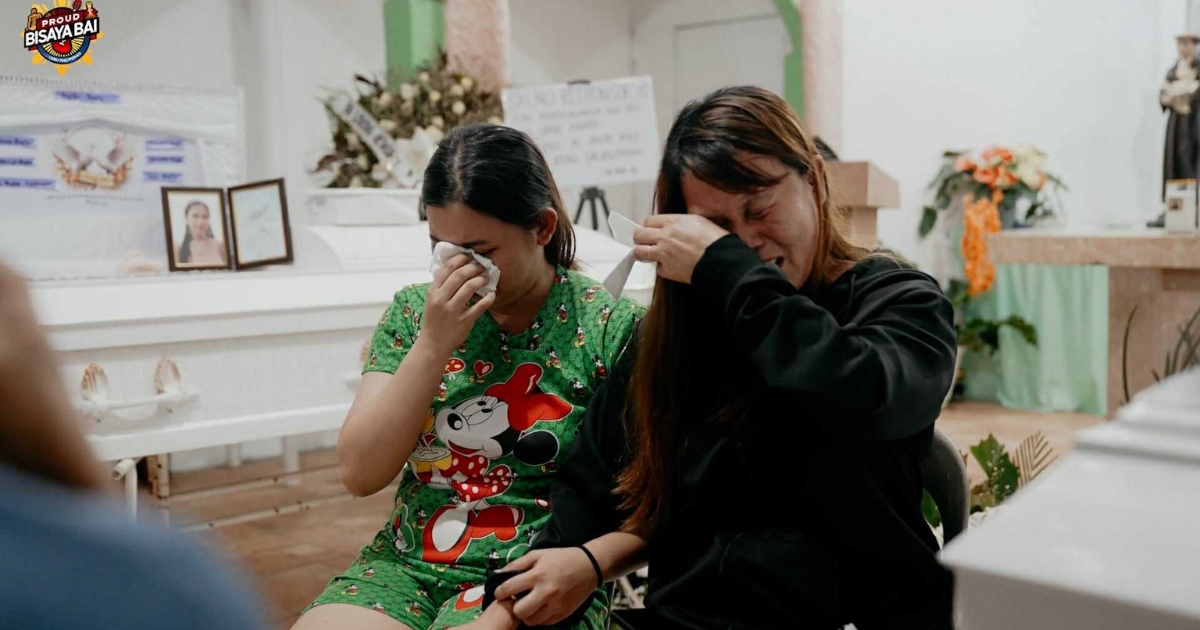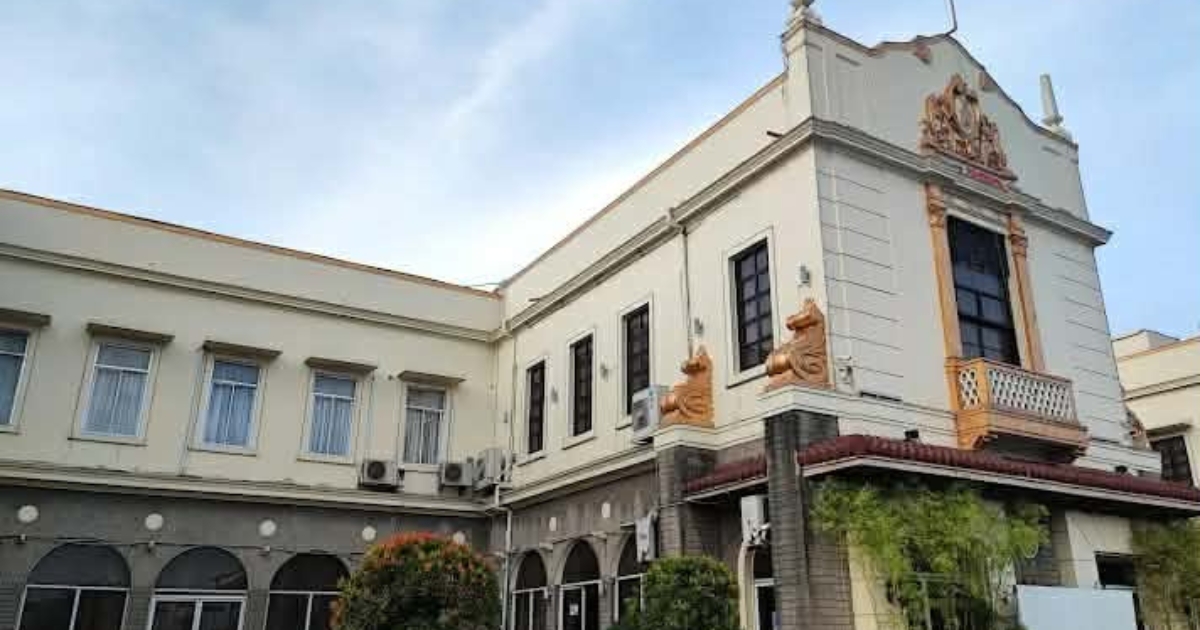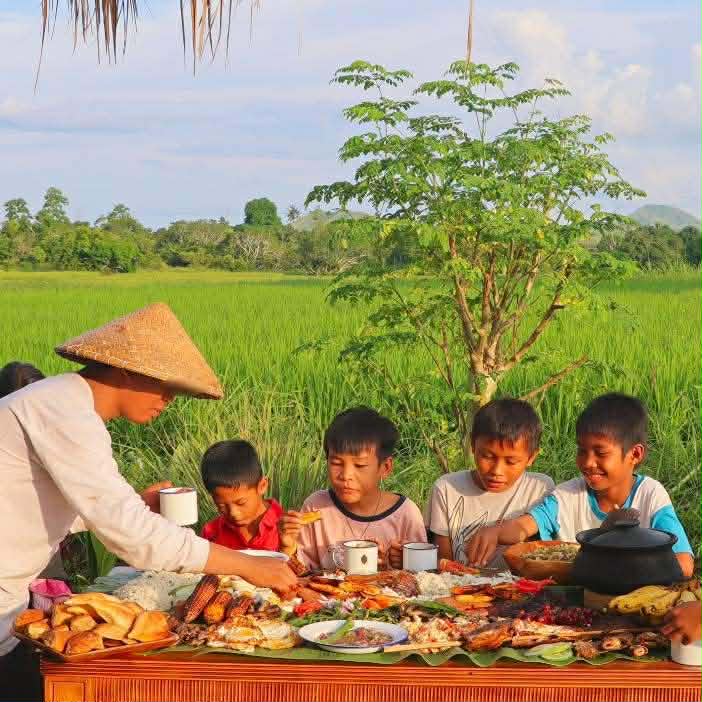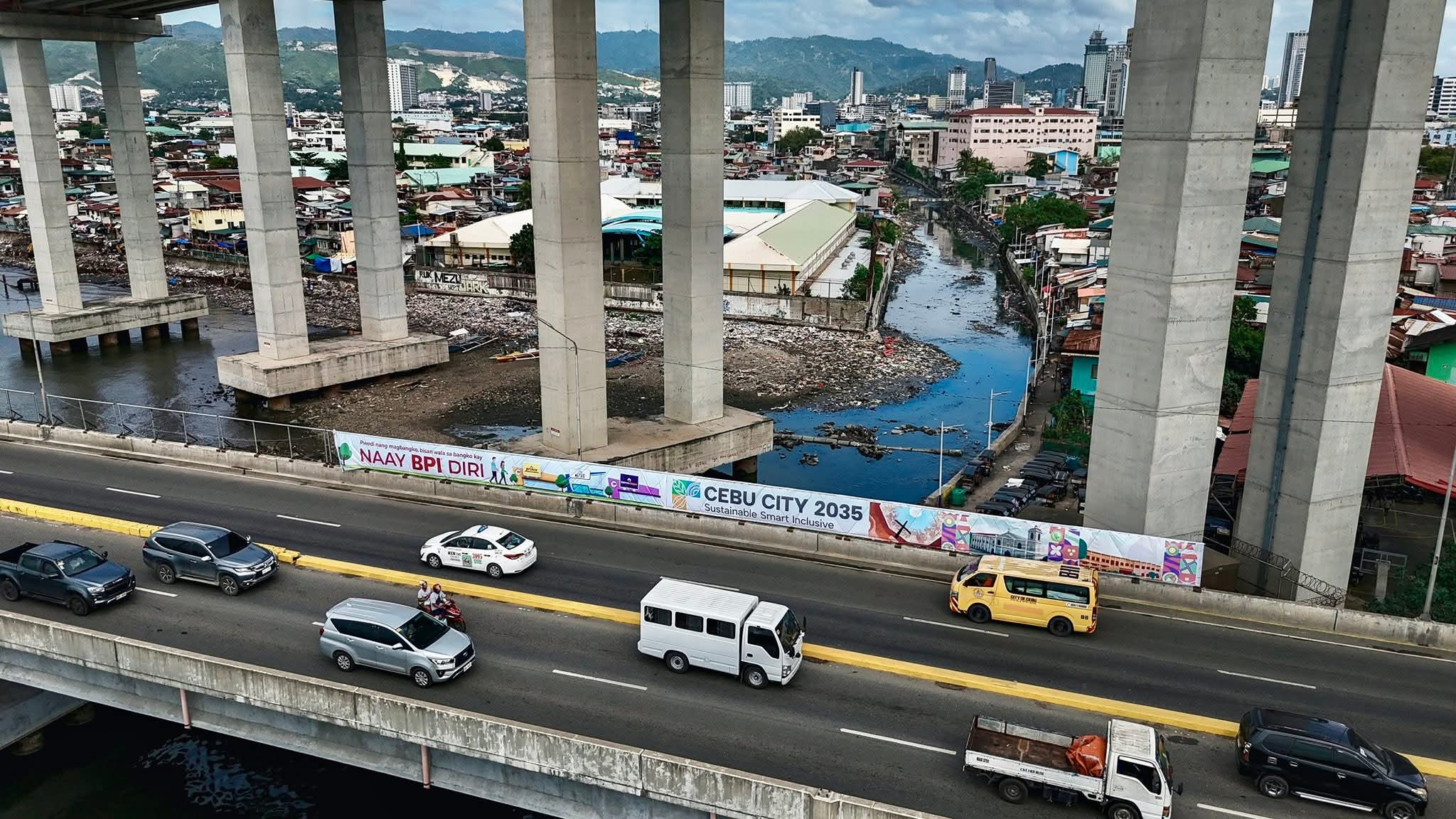The Capuyan family was bound by a love that distance and circumstance could not weaken. Their lives were spread across different towns in Cebu, a practical arrangement rooted in a deep, unwavering connection. Dexie, the 41-year-old matriarch, lived in Lapu-Lapu for her work as a chef. Her three children, Kyle, Ashley and Angel, lived in Tamiao. They were a family accustomed to distance, both physical and emotional but bound by a deep, if sometimes unspoken, love.
On November 2, a rare and precious harmony settled over them. They gathered to celebrate the birthdays of Ashley and their eldest brother, Kyle. For the first time in a long time, they were complete and truly happy. Dexie and the children’s father, though separated, were both present, and for a day, the usual friction vanished. The air was filled with laughter and music as the four of them. Dexie, Ashley, Angel, and Kyle sang “That’s What Friends Are For” together, their voices blending in a moment of unadulterated joy.
Ashley, the pragmatic 21-year-old, felt a strange, unsettling pang amidst the celebration. She looked around at her smiling family and thought, “Is this our last moment as a complete family?” She brushed it off as paranoia but the feeling lingered.
Angel, the youngest, was particularly affectionate that day. At 19, she was still her mother’s shadow, climbing onto Dexie’s lap and following her everywhere. Her sweetness was a constant, but that day it was amplified as if she was trying to bottle the feeling.
It was Kyle who urged everyone to take a family picture. He said, “Ma, pwede picture ‘tang lima?” (Mom, can the five of us take a picture?) Dexie insisted she didn’t want to, explaining that she and their father had separated. Angel intervened, pulling her father and making him sit. Kyle then pleaded, “Smile ma, bisan karon lang sa picture.” (Smile, Mom, even if it’s just for this picture.)
Dexie also insisted that Kyle’s pregnant partner be included. The young woman who was due to give birth at the end of November was touched, thanking them for making her feel like part of the family. It would become their last photograph together, a frozen moment of fleeting wholeness.
Beneath the joy, practical plans were being made. Ashley and Angel had planned to move out by December to give Kyle and his growing family space. Kyle reacted with sadness, asking, &#xNAN;“Inyo diay kong byaan?” (So you’re going to leave me?)
Dexie reminded him that he was married and should focus on his wife and future child.
Kyle replied with heartfelt emotion, “Kahibaw gyud na si mama ba nga pinangga kaayo na nako akong mga manghud. Dili mi magbuwag sauna pa.” (Mom knows how much I love my siblings. We have never been separated before.) He then urged Angel to stay, wanting his kind-hearted sister to be the one to help his partner and soon-to-be daughter. They were all looking toward a future that felt bright and full of promise.
Then came the warnings for Typhoon Tino. Ashley thought that they were safe because the winds were not that strong and they were far from the sea. She had heard from others that the typhoon was going to hit Lapu-Lapu.
The talk of evacuation began. Dexie, worried about her next paycheck, insisted on staying in her Lapu-Lapu boarding house. “Kinahanglan man mutrabaho ni mama para naa tay makaon.” (Mama has to work because we might not have anything to eat by the time payday comes.)
But Angel was frantic with worry. She knew Lapu-Lapu was near the ocean and feared a storm surge. She kept pleading with Ashley to call their mother. “Ma, let’s stay here. Whatever happens, at least we’ll be together”, she begged.
Dexie, trying to be the responsible parent, refused. “Just ensure your safety. I’ll just stay here. Because God forbid something bad happens, you’ll be able to help me out.” It was a mother’s grim logic: don’t put all your eggs in one basket. She thought if she were swept into the sea, her children would be safe on higher ground. The irony would later haunt her forever.
On November 3, Dexie’s resolve wavered. She tried to go to Tamiao, but the world was shutting down; no vehicles were passing by. The updates between mother and children became more frequent. &#xNAN;“Ma, just come because I worry that something might happen to us. At least if anything happens, we’ll be together,” Angel pleaded one last time.
The family in Tamiao felt a false sense of security. The wind was calm, the rain was mild. They were far from the sea, what was there to fear? But by 11 p.m., the character of the storm changed. The wind began to howl, tearing at the roofs. They evacuated to a neighbor’s stronger, two-story house, seeking safety in numbers. Huddled together in the dark during the brownout, they tried to keep their spirits up. They were talking and playing, enjoying the moment, unaware it would be their last hours together as a living and breathing family. When they went to sleep, they did not expect the floodwaters were already rising outside until it was too late.
The owner of the house saw the flood and raised the alarm. It happened at a terrifying speed. There had been no official warnings, no calls to evacuate. The water rose so fast that walking was impossible and the men tried to hold it back at the ground floor while the women hurried up to the terrace.
In a panic, Ashley and Angel called Dexie. “Ma, the water is rising so fast!” They cried over the phone. They were witnesses to their own world dissolving; they could see their own home being wiped away by the churning, debris-filled water. The group saw people including children—a 3-month-old, a 1-year-old, a 2-year-old—floating past, crying for help. The men from their group bravely tried to save the children but at that moment, the structure of the house they were in shuddered and began to collapse.
Chaos erupted. They scrambled onto the roof of the neighboring two-story house, their new, precarious island in a raging sea. Ashley looked around in horror at the submerged landscape and cried out, “Amoa nalang gibarugan na balay ang nagbarog. Asa man diay ang mga balay?” (The house we are standing on is the only one left standing. Where are the other houses?)
Ashley saw a man desperately climbing a wire, his struggle for survival a cynical, horrifying sight. She saw others succumbing to the water. She noted that the house they were refugeing on was strong and had not collapsed despite the flood.
Then, Ashley saw a white bird, a fleeting image that reminded her of the story of Noah where a dove signaled the receding of the flood. A spark of hope ignited in her. “Mag-ampo ta kay mao raba ni katong sa story ni Noah. Basin sign ni nga mugamay ang tubig.” (Let’s pray, maybe this is the sign that the waters will recede), she urged her family and the other survivors.
But the miracle they prayed for did not come as expected. As they held hands, a last massive wave before they could even start praying, carrying a large truck slammed into their refuge. The impact was catastrophic, tearing their linked hands apart and scattering them into the furious water.
Ashley saw her brother hugging his pregnant wife. Then she, who didn’t know how to swim, was plunged into the abyss. She was tossed and turned, swallowing mouthfuls of muddy water. Everyone was struggling, scrambling to get to the surface. Ashley felt someone pulling her hair down, dragging her deeper. She thought, “Wana gyud koy chance ani, di ko kamao mulangoy.” (I really don’t have a chance, I don’t know how to swim.) Every time she fought her way toward the surface, another wave forced her back down. She was certain she would die, believing her brother and sister were the stronger ones, the ones meant to live.
In a final, desperate attempt, she surfaced and miraculously grabbed onto something solid. It was a large, dead pig. Using it as a float, she fought to stay afloat and managed to find her younger sister, Angel. For a precious moment, they were together, Ashley holding Angel, fighting for both their lives.
Then, a new horror. A child, fighting their own losing battle, suddenly clawed at Ashley’s throat, choking her in a panicked grip. Ashley gasped, &#xNAN;“Buhii ko kay kung buhian ko nimo, pataparon tika.” (Let me go because if you do, I will help you.) But the child did not and the hold became stronger.
Ashley’s vision began to spot. She couldn’t breathe. In a heart-wrenching moment of survival instinct, she let go of Angel to pry the child’s hands from her neck. At the blink of her eye, she felt the touch of their fingertips slowly separate.
Ashley was pulled under, her lungs burning. She felt her last breath leave her body. Resigned to her fate, her final thought was a prayer of surrender: &#xNAN;“Lord, ikaw na bahala sa akong kinabuhi. Akong gihatag tanan nimo.” (Lord, I entrust my life to you. I give everything back to you.)
And then, a miracle happened. A searing pain shot through her head. Her hair had tangled in the branches of a submerged tree, anchoring her. Her face broke the surface, just enough for her chin to rest above the water and for her to gasp a shallow, painful breath. The same water that took her tried to save her. She was alive but utterly spent. She looked around for her sister, thinking she might be nearby. She whispered, “Dili ko mugive up para sa akoang manghud basin buhi pa siya.” (I will not give up for my sister, maybe she is still alive.)
She used her last reserves of strength to cut away some branches with her hands but the effort was too much. Ashley was wounded by the sharp tree branches and she blacked out.
When she came to, the world was eerily quiet. She had been awakened by the feel of the receding floodwaters and was terrified to move, afraid another wave would come. She noticed three snakes coiled near her. Poking one with a stick, she watched it slither away and thanked God they had not harmed her. Ashley crawled to higher ground, desperate and thirsty, tilting her head to the sky to drink the falling rain. Using her jacket, she tied herself to the tree branch, a makeshift anchor in case she fell asleep, and finally surrendered to exhaustion.
When she awoke, she saw the child who had choked her, also tangled in a tree, motionless. A storm of emotions raged within her—anger, pity, and the stern understanding that in the face of annihilation, the will to survive overrides all else. She left the child, unsure if it was still alive, her heart too broken and numb to investigate.
Hours passed. No rescue came. No one surveyed their area. It was fellow survivors, residents of Tamiao, who eventually waded through the chest-deep water to help her. They had tried every emergency hotline—911, all of them but no one answered. Ashley’s questioning turned to frustration. “Nganong gitawag sila og rescuers pero di sila mu rescue? Naay available emergency hotlines pero dili mutubag?” (Why are they called rescuers if they won’t rescue? There are available emergency hotlines but they don’t answer?) She lamented, “Sakit kaayo. Mangayo mig tabang gibalibaran rami.” (It’s so painful. We asked for help and we were just rejected.)
When they finally reached a clearing, she begged for help to find Angel, Kyle, and his wife. The official they found merely said, “Mao diay na nahitabo sa inyoha?” (So that’s what happened in your area?) The realization was a crushing blow: the authorities didn’t even know the catastrophe that had unfolded in Tamiao. Hope evaporated.
They called Dexie. “Ma, ayaw nalang kabalaka namo. Mangita ramig pamaagi. Okay rami.” (Mom, don’t worry about us anymore. We’ll find a way. We’re okay.) It was a goodbye disguised as a reassurance.
Dexie, in Lapu-Lapu, had been living her own nightmare. She had begged her boardmates, called 911 and contacted the Lapu-Lapu LGU for help. She had even tried to get a boat but was turned away. Consumed by a mother’s intuition, she prayed, &#xNAN;“Lord, ikaw bahala akoang mga anak nga masafe sila.” (Lord, I entrust my children to you, that they may be safe.) At one point, she thought she would swim the distance just to see if her children were safe. She couldn’t eat or sleep.
Between 5 and 6 p.m., a cold shiver ran through her. Dexie pleaded to God, &#xNAN;“Lord tagai ko og sign sa akong mga anak.” (Lord, give me a sign about my children.) She closed her eyes and saw a vision of her missing son, Kyle, smiling, and her youngest, Angel, looking sorrowful. Dexie asked the vision, “Asa mo?” (Where are you?) Then it disappeared.
Soon after, a neighbor arrived with the devastating news. She was told Angel was gone, but that Ashley had survived. Before the storm, Kyle had said that Angel and his wife would stay together because Angel was to look after his pregnant wife. Their bodies were later found side by side. The mother who had chosen to stay apart to keep them safe was now the only one left with one living child.
For Dexie, her children were her best friends. Through her immeasurable grief, she clutched at the need for purpose. She says that God must have a purpose for everything. Ashley remembered how, even as the water was rising, Angel’s primary concern was for their mother.
Angel was the kindest soul they had ever known, the family’s glue. She couldn’t stand to see her mother and sister cry. Now, they have to learn to accept a reality without her physical presence, wanting her to be at peace. The bond between Ashley and Angel was special; they had dreams they were going to achieve together.
The pain is compounded by a strong sense of injustice. They believe there were lapses in the government’s response. Ashley stated that not everyone can read the news, highlighting the need for physical government presence during calamities. The trauma has made it impossible for her to return to Tamiao.
Now, their final quest is for closure. Kyle’s body has never been found. Ashley, the last to see everything, remembers that after the storm, a sinkhole appeared behind their house in an area that was once a forest. It is deep and smells of death. She believes her brother’s body may be there. She said she would be willing to dive into the foul pit herself to bring her brother home.
Every time Ashley closes her eyes, she doesn’t see darkness. She sees her sister’s hand, their fingertips slipping apart. Moving on is a distant concept. For now, she is just trying to survive, to fulfill the dreams she and Angel shared, and to lean on the faith that saw her through the flood. Dexie chooses to believe that her youngest child, named Angel for a reason, had fulfilled her purpose on earth—to be a blessing to her family and to everyone around her, a brief, beautiful light in a world that can be suddenly, and tragically, dark.











